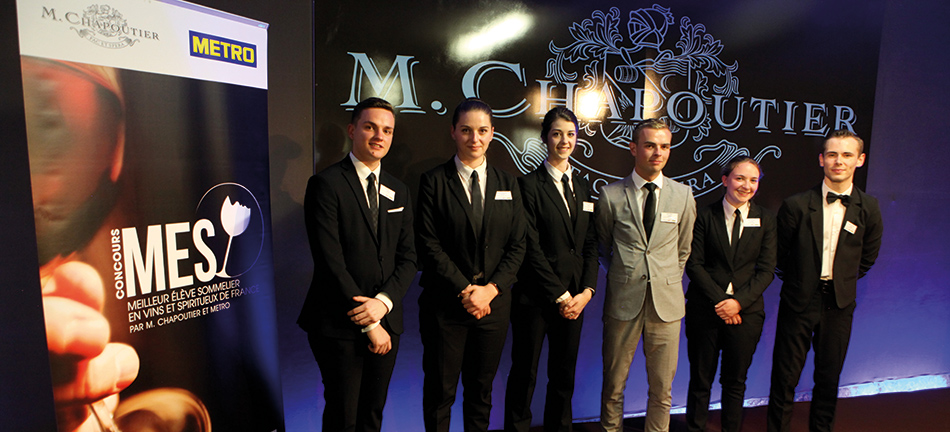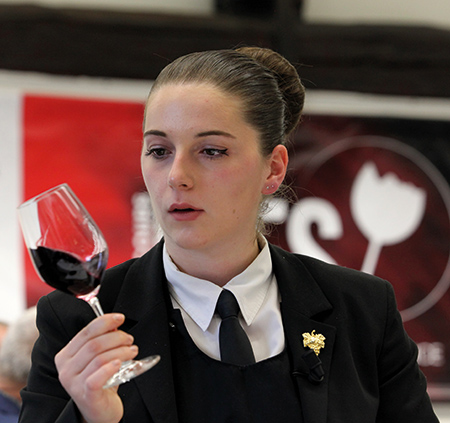She offered the Chamalières hotel school a second consecutive success in this competition which brought together 34 students in complementary and professional certificates. His ease and knowledge allowed him to dominate the finals.

Twelve years after competing in the finals of the Best Student Sommelier in French wines – Grand Prix Chapoutier – Metro Contest, Jean-Baptiste Klein (head sommelier of La Table d’Olivier in Kaysersberg) returned to Tain-l’Hermitage, the setting of his first professional competition. And since 2007, many things have changed. The Alsatian became Best Young Sommelier of France in 2011 then joined the club of the Best Craftsmen of France in 2018. “The level of the competition has risen and I preferred this year to be a member of the jury rather than a candidate”. Another strong trend that is confirmed over the years is the feminisation of the event. At the time of his participation, twelve years ago, the young men were largely in the majority in the final. Pauline Rigaud felt a little lonely ...
Total change of scenery for this 27th edition since at the announcement of the names of the qualified for the last series of tests, we discovered a perfect parity. Mégane Lacoume (Consular Institute of Apprenticeship of Bordeaux), Chloé Laroche (hotel school of Chamalières) and Juliette Robin (Joseph-Storck school in Guebwiller) were then opposed to Manuel Hustache (vocational school of Tain-l’Hermitage), Nicolas Poves (Institute of Chemistry-Oenology of Paris-Provence in Villejuif) and Eilif Rozok (Hotel High School of the Francophonie Park in La Rochelle). Note that the presence of the latter in the finals was a performance in itself. Norwegian, he joined France six years ago to expand his training and spoke almost no French at that time ...

But before thinking about the finals, all had to put their practical and theoretical knowledge to work during the selection that brought together 34 candidates. Not surprisingly, they first studied and commented on a white wine and then a red wine before answering a tricky questionnaire. It was built by the technical committee led by Alain Landolt from the dozens of questions submitted by the sommeliers-trainers themselves.
As from the scoring which allowed to keep the six best for the finals, Chloé Laroche already widened the gap on the other candidates. A gap she widened a little more after. At the draw of the running order, Thomas Vivant’s student got the number one. And at the end of her performance, her mastery, ease and knowledge had marked the minds of both the jury and the audience where we could find the candidates eliminated the day before and their teachers. Unsurprisingly, the student of Chamalières, already noticed for her presence in the semifinals of the contest for the Best Young Sommelier of France - Duval-Leroy Trophy, has written a beautiful new line on her resume. “Very early I felt a real potential in her,” concluded her teacher who could bring back to Auvergne a second consecutive success. Indeed one of his students, Manon Durand, won the trophy in 2018.
This year Eilif Rozok and Juliette Robin climbed on the podium too. The other three share the fourth place. As is traditional, the six finalists will head for Australia in January 2020. And this time they will be accompanied by two teachers. Véronique Martin (La Rochelle) and Frédéric Simon (Guebwiller), Jean-Baptiste Klein’s former teacher, will discover the southern hemisphere and its viticulture.
Jean Bernard
Where does your passion for wine come from?
It all started at Mr. Bocuse’s restaurant where I was once having lunch with my parents. Looking at the people working around me, I had a revelation and I said to myself: that’s what I’ll do later. The interest for the wine came when I started my studies in the hotel business after a general baccalaureat. I first followed a scale-up training before I passed a vocational degree option for culinary and table arts and little by little I realized that the profession of sommelier is very important in a restaurant and I wanted to undertake the experiment by registering in a complementary certificate. And there, I really found a very rich and varied world, from the grape varieties to the winemakers, which I enjoyed discovering.
Your teacher Thomas Vivant was convinced of your success for several months.
How did you prepare?
I prepared myself for a very long time, with my teacher, other teachers of the hotel school of Chamalières, classmates and colleagues since I did an internship at Bernard Loiseau. Eric Goettelmann and his two sommeliers Lucas and Maxime helped me a lot for this contest. More personally, it was very intense in terms of acquiring knowledge. It goes through a book about wine, an experience, a meeting and it’s a daily learning. Sommelier is one of the few professions where you learn throughout your career and I am very happy to be one of its representatives ...
Last April, you were the only student of the complementary
certificate in the semifinals of the Contest of the Best Young Sommelier of France.
Was this experience helpful?
Indeed, I stopped at the doors of the finals because in front of me there were formidable candidates. Young professionals more experienced than me in terms of knowledge and in the field too. But that brought me nothing but positive and was a great training for the Chapoutier competition. And above all it gave me a lot of motivation for this event that I absolutely wanted to win.
At 22, you are getting into the labour market. Where will we be lucky to meet you?
I am moving to Paris to begin my career as a sommelier at the Bristol hotel, alongside Mr. Neveu and his team in the gourmet restaurant L’Epicure.